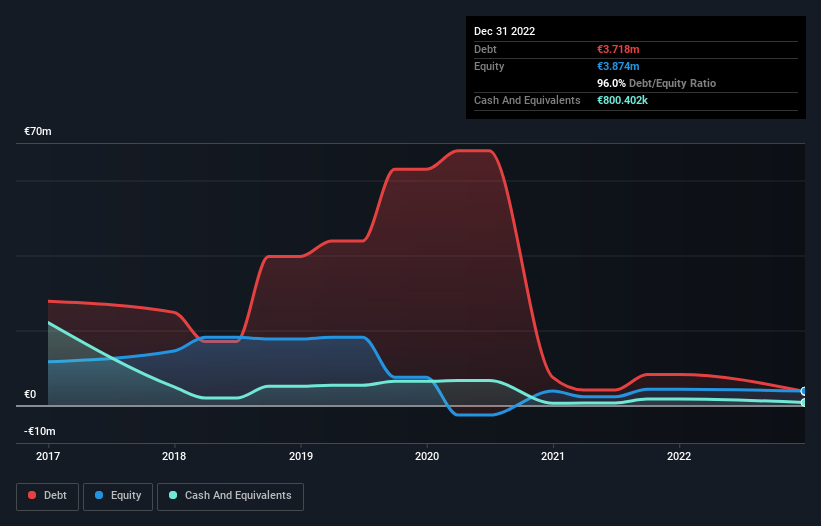David Iben put it well when he said, 'Volatility is not a risk we care about. What we care about is avoiding the permanent loss of capital.' So it might be obvious that you need to consider debt, when you think about how risky any given stock is, because too much debt can sink a company. Importantly, Biotechnology Assets, S.A. (BME:BST) does carry debt. But is this debt a concern to shareholders?
Why Does Debt Bring Risk?
Debt and other liabilities become risky for a business when it cannot easily fulfill those obligations, either with free cash flow or by raising capital at an attractive price. Part and parcel of capitalism is the process of 'creative destruction' where failed businesses are mercilessly liquidated by their bankers. However, a more frequent (but still costly) occurrence is where a company must issue shares at bargain-basement prices, permanently diluting shareholders, just to shore up its balance sheet. Having said that, the most common situation is where a company manages its debt reasonably well - and to its own advantage. When we examine debt levels, we first consider both cash and debt levels, together.
View our latest analysis for Biotechnology Assets
What Is Biotechnology Assets's Net Debt?
The image below, which you can click on for greater detail, shows that Biotechnology Assets had debt of €3.72m at the end of December 2022, a reduction from €8.25m over a year. However, it also had €800.4k in cash, and so its net debt is €2.92m.

A Look At Biotechnology Assets' Liabilities
Zooming in on the latest balance sheet data, we can see that Biotechnology Assets had liabilities of €3.54m due within 12 months and liabilities of €11.1m due beyond that. On the other hand, it had cash of €800.4k and €2.32m worth of receivables due within a year. So it has liabilities totalling €11.5m more than its cash and near-term receivables, combined.
While this might seem like a lot, it is not so bad since Biotechnology Assets has a market capitalization of €21.6m, and so it could probably strengthen its balance sheet by raising capital if it needed to. But we definitely want to keep our eyes open to indications that its debt is bringing too much risk. When analysing debt levels, the balance sheet is the obvious place to start. But it is Biotechnology Assets's earnings that will influence how the balance sheet holds up in the future. So if you're keen to discover more about its earnings, it might be worth checking out this graph of its long term earnings trend.
In the last year Biotechnology Assets had a loss before interest and tax, and actually shrunk its revenue by 9.9%, to €3.0m. That's not what we would hope to see.
Caveat Emptor
Over the last twelve months Biotechnology Assets produced an earnings before interest and tax (EBIT) loss. Indeed, it lost €1.7m at the EBIT level. When we look at that and recall the liabilities on its balance sheet, relative to cash, it seems unwise to us for the company to have any debt. Quite frankly we think the balance sheet is far from match-fit, although it could be improved with time. Another cause for caution is that is bled €2.1m in negative free cash flow over the last twelve months. So suffice it to say we consider the stock very risky. When analysing debt levels, the balance sheet is the obvious place to start. But ultimately, every company can contain risks that exist outside of the balance sheet. For example, we've discovered 5 warning signs for Biotechnology Assets (2 are potentially serious!) that you should be aware of before investing here.
Of course, if you're the type of investor who prefers buying stocks without the burden of debt, then don't hesitate to discover our exclusive list of net cash growth stocks, today.
Valuation is complex, but we're here to simplify it.
Discover if Biotechnology Assets might be undervalued or overvalued with our detailed analysis, featuring fair value estimates, potential risks, dividends, insider trades, and its financial condition.
Access Free AnalysisHave feedback on this article? Concerned about the content? Get in touch with us directly. Alternatively, email editorial-team (at) simplywallst.com.
This article by Simply Wall St is general in nature. We provide commentary based on historical data and analyst forecasts only using an unbiased methodology and our articles are not intended to be financial advice. It does not constitute a recommendation to buy or sell any stock, and does not take account of your objectives, or your financial situation. We aim to bring you long-term focused analysis driven by fundamental data. Note that our analysis may not factor in the latest price-sensitive company announcements or qualitative material. Simply Wall St has no position in any stocks mentioned.
About BME:BST
Biotechnology Assets
Develops and markets biotechnological assets for application in the biopharmaceutical, agrochemical, cosmetic, veterinary, and chemical industry sectors in Spain and internationally.
Mediocre balance sheet with low risk.
Market Insights
Community Narratives



